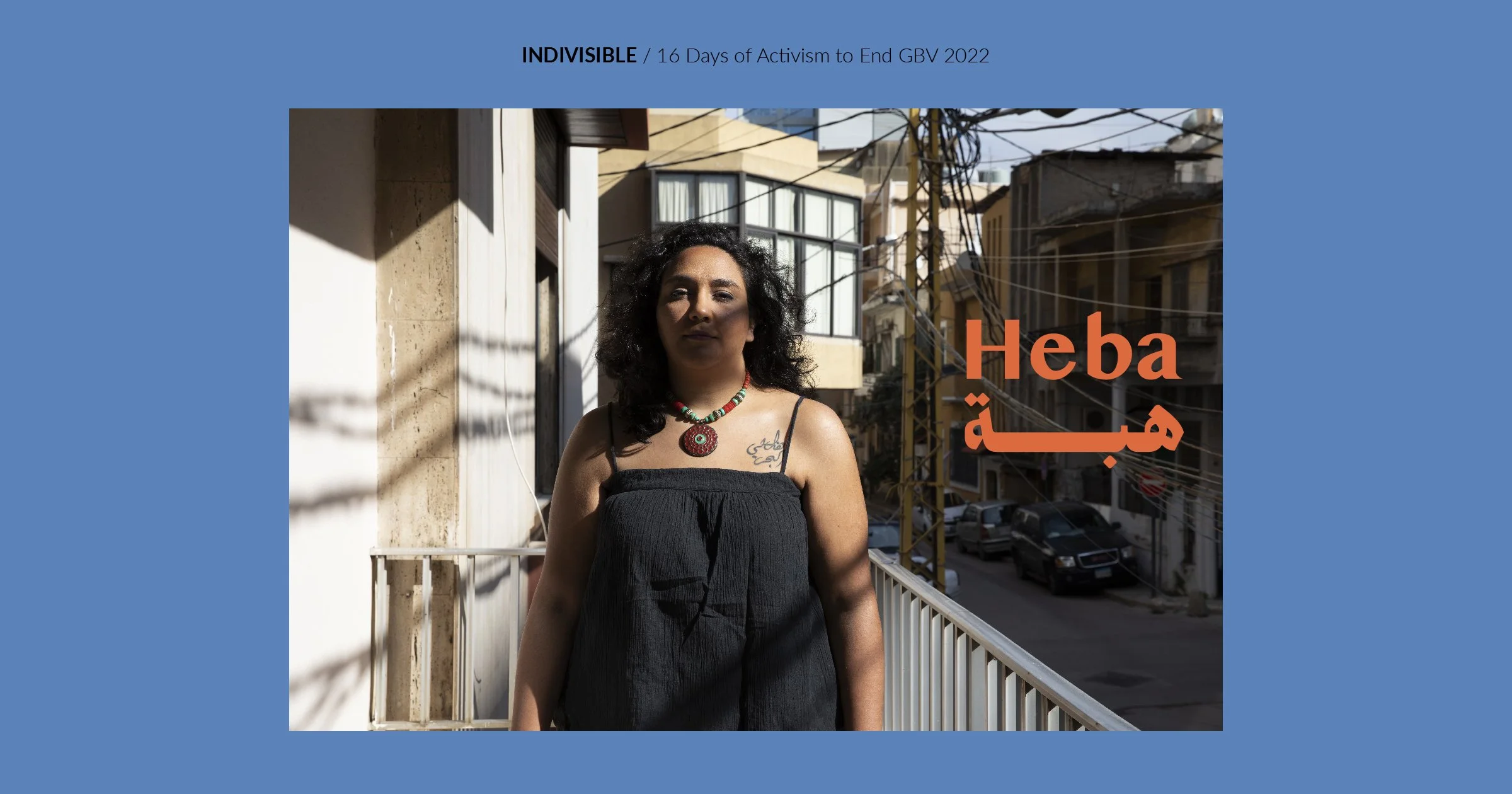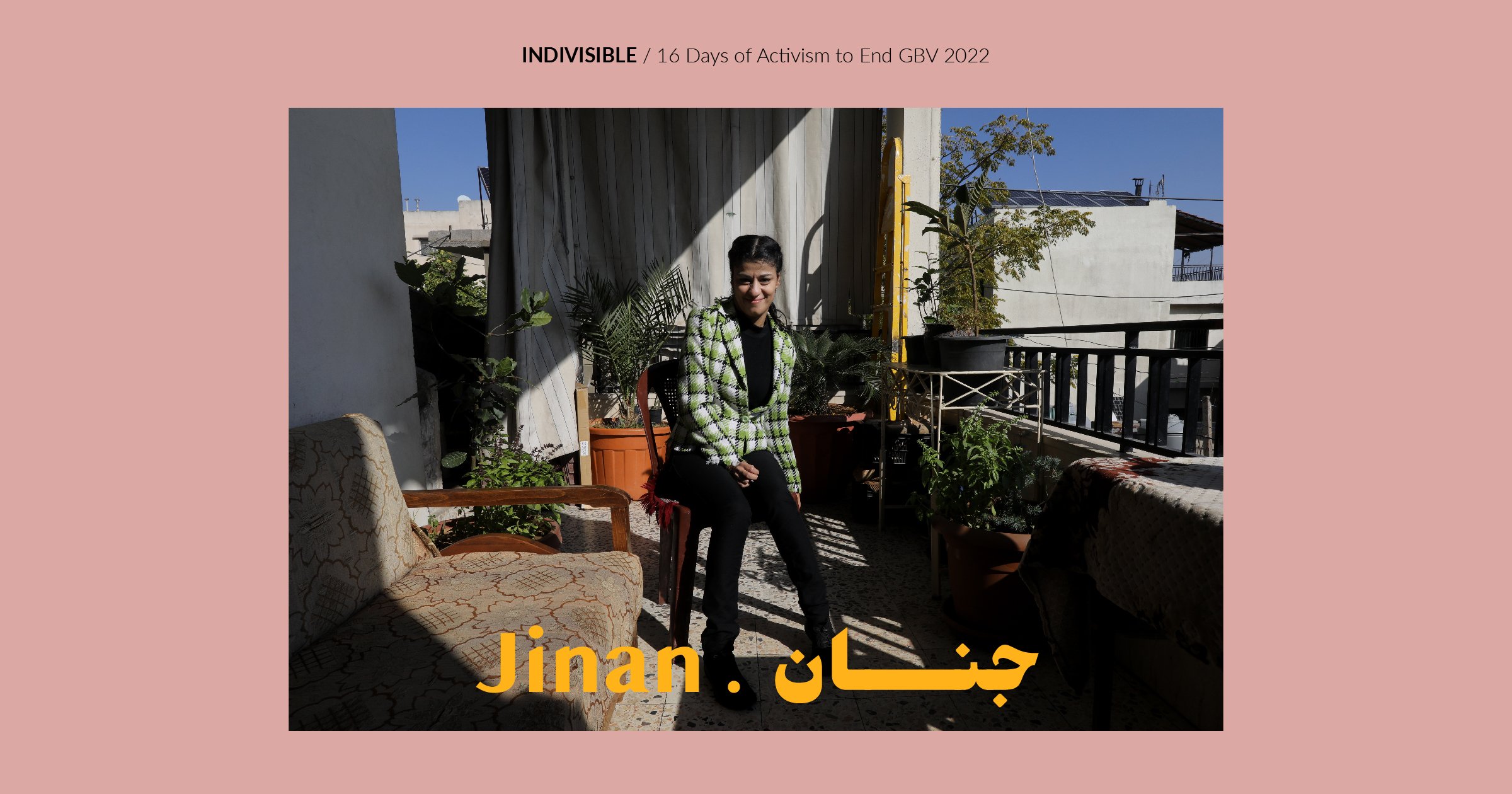Malak: Raising new generations free from GBV
"You can report me but how long will they imprison me? One day, two days, a month? Two months? a year? I will come out and kill you”. These were words Malak, 43, heard over and over from her abusive husband even while pregnant.
Carmen and Ali: A Queer relationship in a cis-heteronormative society
Carmen met Ali in 2011, not realizing that this meeting would help her discover her sexuality in later years. Her home life robbed her of the ability to consider her options. Constant abuse from her older brother forced her to choose the marital prison to escape her familial cage; disregarding her feelings for Ali. “He looked manly, the way he spoke, his mannerisms, even the way he dressed. I felt a strong attraction towards him but ignored it because it could only bring me more trouble.
Loujein: Any crime against me is left unpunished
I felt fabulous. I was fabulous. The music was perfect, the mood was perfect. But suddenly and in the blink of an eye, all that vanished into thin air. Furious police officers barged in, and the music was replaced by their enraged voices screaming at us from the top of their lungs. For a moment there, I had forgotten I was in Syria and that just being there was illegal. All I can remember after that is being on the floor with men in official suits beating me up. Next, I’m in prison.
Jack: Gender based violence is not gender specific
Jack is a 32-year-old Iraqi trans man. A few months back he decided to leave Iraq and move to Lebanon to do his top surgery and spare himself and his family the social quarrels with the conservative tribal entourage, he wouldn’t find the tolerance and acceptance that would let him live comfortably with his body. He reminisces about his childhood, he remembers how he used to look different from his siblings, he always had facial hair despite the feminizing hormones prescribed by the doctor, whom he was forced to visit by his father, without considering Jack’s preference. While in Iraq, he was introduced to the queer community through social media, he maintained virtual friendships with people from Lebanon, Syria, Egypt, Morocco, Algeria and other places from the world, he couldn’t recognize members of the community where he lived due to social difficulties. He remembers one guy who was beaten to death by a bunch of fanatics who considered him “pervert” for having long hair. Jack says that the phenomenon of physical attacks on people with tattoos and long hair for being considered as “perverts” is quiet spread.
Farah: Syrian in Lebanon and Lebanese in Syria
Farah was born in Beirut in 1995, to a Lebanese mother and a Syrian father. Her mother used to obtain student residence permit for her and her 3 sisters on an annual basis. Back then, the information issued by the general security regarding Lebanese mothers and their children were very ambiguous, so Farah’s mother used to ask for these annual permits, until she discovered by coincidence that she could ask for the infamous courtesy residency permit.
Theodora: Her Gender made her an incomplete Lebanese citizen
“No words express the extent of the injustice that befalls us as women. What is this country that treats me as an incomplete citizen and rejects my daughter and deprives her of her right to be Lebanese?" With these words Theodora begins.
Heba: Many obstacles, limited options.
Heba's father used to work in the Palestinian National Crescent, and in the early nineties he had three options: either to immigrate to Europe, or to stay here and obtain Lebanese citizenship, or to stay here while refusing citizenship. He chose to stay because he was attached to this land, but he refused the Lebanese nationality as a principle related to the Palestinian cause.
Tema: The orange fox
Between peace and violence, Tema describes to us the transition phase she is going through; she throws behind her back the abuse of her “kafeel”, the abuse of her ex-husband, and all the racism and discrimination she has to endure on a daily basis. She looks forward to hearing the children laughing and playing, and she shares with us the project she started after gaining her independence.
Green: Struggling with denial, self-blame and rejection
The father was waiting eagerly for his crown prince to be born. But after 9 months, his wife gave birth to yet a third baby girl. Having been disappointed twice before that, Green's father did not accept this shocking outcome and he did everything in his power to convince himself that this baby girl is indeed the boy he has been waiting for. And as "his boy", he would take her with him when he goes to hang out with his male friends, he would pick up her boyish outfits himself, and he would even talk to her like one of his buddies to the extent of sending her pictures of hot girls.
Nicole: Discrimination from within and outside
Nicole began exploring her sexuality at a young age. By the time she was twelve, she had her first kiss with her best friend, but decided to ignore her feelings and deny them. At that time, awareness was not available, so nothing related to that kiss felt normal. She eventually decided to move on and forget that incident.
Ghada: Motherhood is a never-ending journey
After thirty years of leading a life without an involved partner, Ghada decided to divorce her husband and did it without difficulty. “No luck, after thirty years of marriage... there was no luck.” Ghada is a mother of four. She took on the responsibility of raising and looking after them on her own. Despite all the challenges, she resisted and endured, and when she decided to get divorced, she was already financially independent.
Sonia: Sex worker before becoming a nun
Sonia, 62 years old, lives alone in Broumana, without any friends, people there avoid her, harass her and insult her from time to time. Sonia says that she knows some homosexuals who live there, but they avoid her every time she runs into them, as if they don’t know her. Sonia adds: “I don’t know why people are afraid of trans, while they accept homosexuals more than they accept us”.
Maya: Jailed for trying to kill my rapist
Maya tried to kill her maternal uncle who was raping her since she was nine years old. “I thought if I kill him, I will put an end to my nightmare and my justice will be served. Instead, I was sentenced to six years in prison. The worst part is that I was being raped by dozens in prison, while outside of prison, I was only being raped by one person.”
Georgina: Women are denied the right to inheritance
Georgina was sixteen years old when she opened up to her parents about her identity, but her father told her to stay away from such “things”. When she replied that it is her character since she was little and it was beyond her control, he took her to a psychologist to get treatment. The doctor told them that her female hormones are dominant and cannot be treated.
Access Kitchen: Giving agency back
For years, most women with disabilities have lost the opportunity to integrate into the Lebanese society. When they apply for jobs, no one is interested in exploring their real capacities in working and being productive. Moreover, they are often subjected to prejudice, as indicated by one of the workers in the kitchen, based on their disability, which requires them to perform fewer tasks and be paid a lower salary compared to other workers.
FLORA: A woman living under "Kafala system"
On a Sunday morning, Flora met her older sister Maria, and her friends Rita, Patricia, and Agnes among other women coming from Kenya, Sierra Leone, Ethiopia and Nigeria to the church in Burj Hammoud. They spend their time together singing, laughing, praying and discussing different topics, from racism to work, religion and their lives as migrant women working and living in Lebanon.
Sari: Taking control of her life after being locked by modern slavery and forced to work
Sari (Sarktelu) was born in 1995 in Ethiopia. In 2011, she came to Lebanon to visit her sister who was already working in a household. When she entered the country, she had to sign a contract she could not understand or even read as it was written in Arabic. In fact, she had no clue she was coming to work. After only 15 days and against her will, she ended up working in the house of her sister’s employer's daughter as a migrant domestic worker and therefore was trapped into the Kafala system.
Jinane: Women fight for access to education
While looking at her old journal, Jinan realizes the improvement in her handwriting. She is also conscious that the letters and words are windows to the soul as well as to distant horizons. She believes they can transport you to places where the soul and the mind connect. The young woman suffers from reduced mobility resulting from cerebral palsy since birth.




















